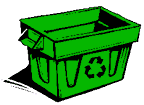by Larry
November, 2009From Junk to Modest Riches - Recycling Pays!In times of scarcity throughout history, versatile ways of making do have been more the norm than the exception. In World War II, for instance, Nazi occupied France had its gasoline ration set at only 2% of pre-war levels. Somehow, though, Parisian taxi drivers continued to chauffer passengers about, often utilizing novel ways to harness energy, from garbage, natural gas, etc.
These days, motivated by low budgets or simply concerns for our ever more stressed environments, multitudes of folks, from the third world poor to suburban gardeners or cityscape conservationists, are getting into the recycling habit in a big way, frequently with rewarding results.
I work at Recycled Reads, for instance, a cute concept that is annually adding hundreds of thousands of dollars to the Austin Public Libraries' special projects coffers via the simple notion of putting old books back in service. Donated, discarded, and withdrawn tomes are processed, put out on our shelves in their correct categories, and then sold to an increasingly happy throng of customers for from 50 cents to $2 each. Nowadays, hundreds of people come by on a typical weekend, more stream in through the weekdays, the landfills get less input, and our donations are up as well. Everyone is a winner. The idea for this piece's title actually came from seeing, on any given volunteer library shift, from one to five entrepreneurial book dealers scouring our fresh loads of processed books for ones that are in demand online. They invest maybe $1.50 per book for these at the shop where I work, then resell them for a net profit after their shipping costs of 4-5 times that. By repeating this maybe 10 times a day, a moderate, low-stress living can be had from recycling our city's literary "trash." While I was in college, I met folks otherwise unemployed who routinely went around collecting furniture and appliances cast off onto people's curbs. They then fixed them up a bit and sold them in garage and yard sales for "free money." Others would do this with "junk" cars. Still others with houses picked up cheap via delinquent tax auctions at the courthouse. All of these practices are entirely legal, often lucrative, and persist to this day as part of the "underground economy" that helps a lot of folks get by when their personal financial times are challenging. Most everyone is familiar with turning table scrap or lawn compost into rich mulch for use in the garden and then growing one's own organic veggies in it. This is perhaps the original and most natural way of transforming waste into health and wealth. Besides that, who has not at times enjoyed getting thrift store clothes at bargain prices or other hand-me-down kinds of recycled attire, gifts, etc.? One may feel almost as much satisfaction from donating extra or no longer personally needed items to the A.R.C., Goodwill, or Salvation Army.
But what about larger discards? Out in Oakland, CA, the independent spirit is alive and well in Tim Anderson, an Oakland resident who, per NPR - Do-It-Yourself Guru Makes Treasures From Trash, now takes regular San Francisco Bay spins on his own 30-foot sailboat, scrounged from others' leavings. That is besides his other 200 already reported projects or techniques for putting odd bits of this and that to use, like a dimmer switch for homemade electric motors, or like a handy paper shredder with an elbow grease crank, etc.
When I was in India, I saw huge quantities of natural "weeds" being harvested to help heat a large spiritual compound, cook its food, and keep at bay the course of the Beas River, which otherwise threatened to undermine the colony's earthen foundation. Similarly, today in Bangladesh scientists and engineers are hoping to use natural drifts and jams of vegetation to contain or divert the flows of large bodies of water in flood and so create new deltas and islands, thus creating potentially millions of new acres of arable land. Besides such mammoth scale projects, there are now new websites popping up to show folks how to take junky debris, pieces of plastic, paper, fabric, or glass from beaches, marshes, or other sites, and turn the free materials into works of art, shopping bags, Halloween or Christmas decorations, organizational devices, storage containers, reusable CDs and cases, etc. For example, check out the ideas at this guide: About.com - Craft Green by Making these Trash to Treasure Crafts. All these and many more green notions show how the individual can make a difference as we tackle the challenges of protecting and restoring the environment. But we ought not to discount the contributions of seriously for-profit enterprises too. Of course, the Waste Management Corporation (WMI) has its detractors, but at least it has been in this business of disposing of and recycling garbage and junk for a long while. Newer and greener companies are appearing all the time. More will keep doing so, for recycling is a profitable industry still in its infancy, but for which there is and will be a mushrooming and perhaps unending demand. |

